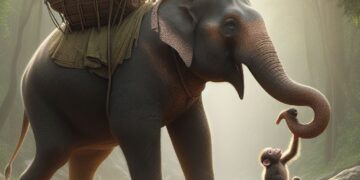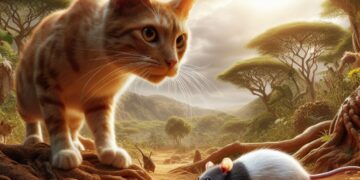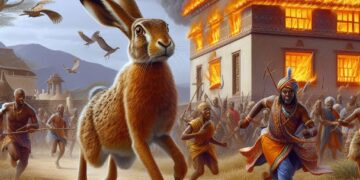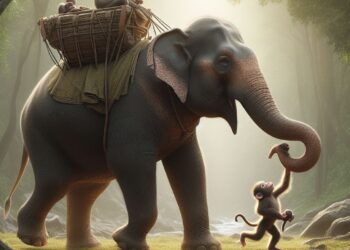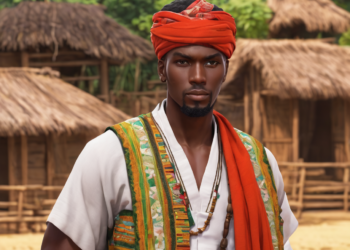Once upon a time, in a small village surrounded with rolling hills, there lived two step-brothers named Kato and Amari. Kato and Amari were so close that they were inseparable. They did everything together, from playing games to looking after their father’s cattle. Kato had lost his mother at an early age, and their father had married a woman named Anek, who became their step-mother.
Anek, however, had a dark heart. She didn’t like Kato, and the bond between the two boys only made her more resentful. Despite her coldness, the boys remained loyal to each other. Every day, they took the cattle to graze in the lush meadows. Among the cattle was a gentle cow that provided milk for the boys whenever they were hungry. They had a special rule: each boy would milk two of the cow’s four teats, sharing the task equally.
The boys had a special way of addressing each other—they called each other “Son of my father” because they were both sons of the same man. Their camaraderie was a beautiful thing, but it deeply annoyed Anek, who wanted to drive a wedge between them. She thought to herself, “I must find a way to get rid of Kato.”
One day, Anek hatched a sinister plan. As the boys were preparing to take the cattle out to graze, she called Amari aside and said, “Today, you must return home at midday for a haircut.” Amari, unaware of her intentions, nodded obediently. At midday, he left Kato with the cattle, went home for his haircut, drank some milk, and then returned to the fields.
The next day, it was Kato’s turn to go home for a haircut. Before he arrived, Anek dug a deep, dark hole at the head of the bed and covered it with a large stone. When Kato came home, she sent him to fetch a razor from the head of the bed. As Kato leaned over, he fell into the hole. Quick as a flash, Anek covered the hole with the heavy stone, trapping Kato inside.
When Amari returned with the cattle in the evening, he noticed Kato was missing. He asked Anek where Kato was, but she feigned ignorance. “I gave him a haircut, and he went back to the fields,” she lied. The villagers searched high and low for Kato, but he was nowhere to be found. They sadly concluded that he must have been taken by wild animals.
Time passed, and the village moved to a new location, burning the old village to the ground. When the rains came, tall grass sprouted over the old settlement. One day, Amari, who had mourned his brother until he could cry no more, decided to take the cattle to graze in the old village site. He wandered around, his heart heavy with memories of Kato.
As he sat on the large stone covering the hole, Amari began to sing a song they used to sing together while milking their cow:
“Son of my father The udder of the dapple grey is bursting with milk But I will not draw from your teats Son of my father.”
To his astonishment, he heard a faint reply from beneath the stone:
“Son of my father You may draw and let it nurture you Son of my father It was your mother who put me into the hole.”
At first, Amari thought it was an echo. But when he sang again and heard the same reply, he realized it was Kato’s voice coming from beneath the stone. Amari frantically rolled the stone away and found his brother, weak and dirty, but alive. Kato had survived by eating soil, and his clothes were tattered. His eyes were sensitive to the light, having been in the darkness for so long.
Amari quickly helped Kato out of the hole, gave him fresh clothes, and milked one of the cows to give him some fresh milk. He made Kato vomit the soil he had eaten and then fed him more milk until he regained some strength. As evening approached, the brothers set off for home together.
On their way, Kato recounted how Anek had trapped him in the hole. Amari’s heart filled with fury. He loved his brother more than anyone else, and the thought of the wickedness done to Kato enraged him. As they neared their home, Amari sharpened his spear until it was razor-sharp. When they arrived, he stormed into the house and speared Anek to death without hesitation.
Amari then sought out their father and told him everything that had happened. The men of the village gathered to listen to the tale. They were shocked but silent, knowing there was nothing to be done to change the past. They accepted the truth and allowed the boys to live in peace.
From that day on, Kato and Amari lived happily without Anek. They continued to look after their cattle, sharing the duties and the joys of life as they always had. The bond between them grew even stronger, and their story became a legend in the village.



